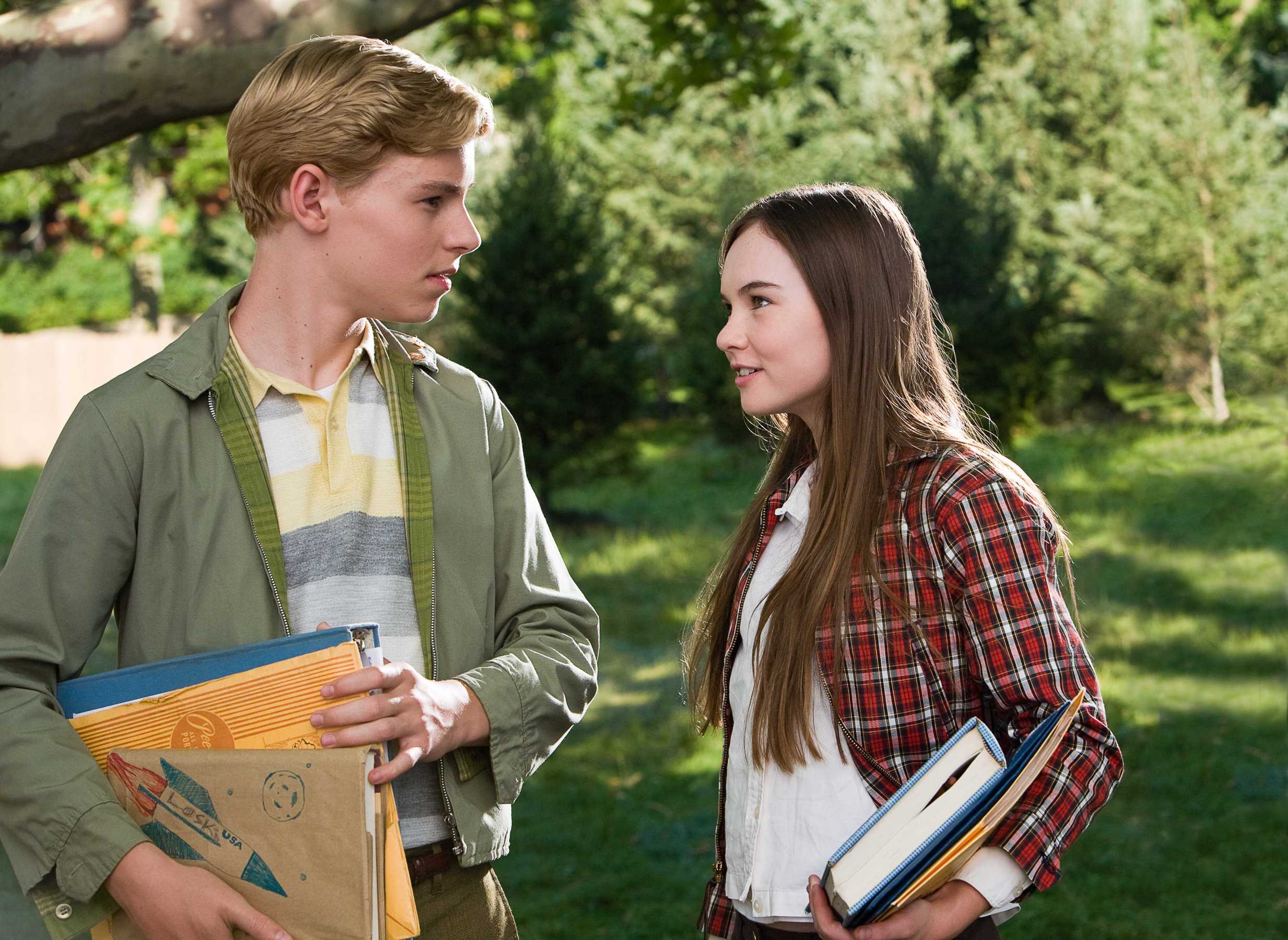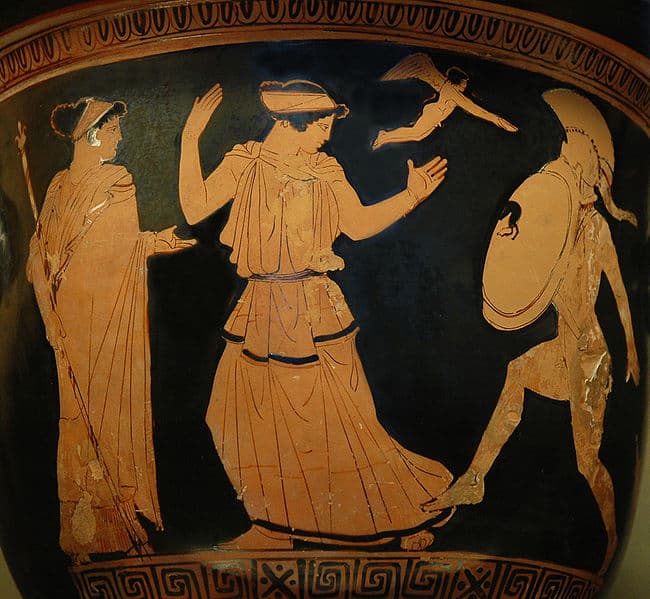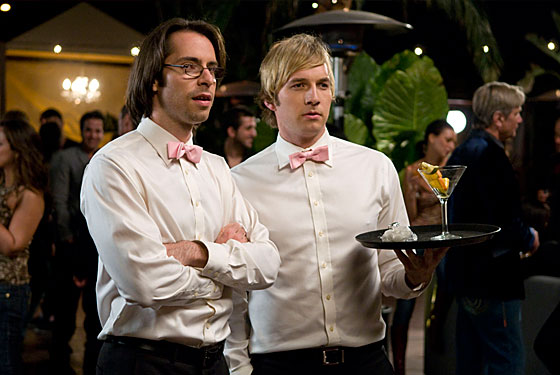Vince Gilligan has said
Breaking Bad is about a man who makes a bad decision and spirals downward. Walter White may have had his flaws, but he started the show as a basically decent family man in a tough spot. Along the way, it hasn't always been pretty. Lately, though, some fans have been saying they no longer sympathize with Walt. I think this week's episode,
"Shotgun," may have been where he turned the corner for me. Almost everything he did was jerky.
We start where we left off. Walt has just learned that Jesse is missing and he's rushing through traffic to do something. He calls Saul to make sure his wife gets all the money. (Hey, it's against the law to talk on your cell while weaving in and out of traffic like a madman. BTW, no Saul this episode.) Next he calls his wife but can't quite tell her what's happening and just says he loves her. Then he pulls into the chicken man's parking lot.
He has a gun. Gus (who seems to be there) won't see him. Now think about this. Walter may be brilliant in many ways, but he's not street smart and lets his emotions get the better of him. First, there's no way Gus would agree to see him, even if Walt were frisked. Gus knows Walt might make a move. Second, if Walt made a move, he'd almost certainly end up dead. Third, Gus's whole style (and it's what makes him the professional that Walt isn't) is to hide in plain sight, so having a big altercation with Walt is a disaster for both. (He has met Walt in public before, but the connection made sense so no one minded.) In fact, if Walt makes a big enough nuisance of himself (even assuming Gus knows he won't blow their cover) Gus might cut his losses and kill him. He killed Victor because he was seen at the scene of a crime, after all. Gus needs Walt to cook, and he can't quickly replace him, but he'd drop it all at the threat of losing everything.
Mike (no doubt called by Gus, who saw Walt on the store cameras) calls Walt and lets him know he has Jesse, who's okay, now go back to the lab and start cooking. Meanwhile, is Gus calling in some boys to take care of Walt? (He wouldn't call the cops, presumably, but the store's manager might call security.) Walt, continuing his dumb-ass move, marches behind the counter and into Gus's office. Gus is long gone. Lucky for Walt.
Meanwhile, Mike is still driving Jesse. (Jesse's driving shotgun, where part of the title comes from.) They're going out to the middle of the desert. Jesse's been through this before with Tuco, and it wasn't pretty. Mike doesn't explain what's going on. Jesse pulls out his keys. Good. I doubt he could fight off Mike, but at least it shows he cares again. They stop and get out. Mike gets a shovel from the trunk--the old dig-your-own-grave bit? He walks past Jesse, not even trying to defend himself, as if Jesse is beneath contempt. Mike digs up a money bag. It's a drop. This is part of his job. (When we first met Mike, he seemed like an independent PI who worked a lot for Saul. I think once the show realized he was a great character, they turned him into Gus's right-hand man. What doesn't he do for the guy?) Mike puts the money and shovel in his trunk and gets back in the car. He asks Jesse if he's coming, since they've got six more pick-ups to make.
At Hank's place, his cop friend on the murder case drops by. Hank tells him what he can--including the names of Badger and Jesse. Hank notes he and Jesse have a history. He also says that Jesse didn't strike him as the kind of guy who'd shoot someone. He's right. The friend has a composite of the person of interest spotted at the scene--Victor, of course. No one's gonna be finding him. There are also some prints. I still think they're Gus's. Anyway, Hank begs off the case. With Heisenberg gone, the quest is over.
Another drop. Jesse waits outside, guarding Mike's car. Mike is dismissive. Jesse says I'm a back-up, shouldn't I have a gun. Does he really think they'd give him a gun? Mike acts disgusted. Also won't let him smoke (the ultimate insult to Jesse). (Gus is still coughing a little--does he have a problem?) We get a fancily shot montage of the pickups. They keep driving and Jesse runs off at the mouth about how bored he is. Jesse is reminded of the old dead drops he had with his crew. He's coming back to life, which seems to be at least part of the plan. Finally Mike has had enough and pulls off the road. He tells Jesse he's not part of any plan of his, that he had a back-up (Victor, one assumes), but Jesse can't do it and Mike is just following orders.
At the lab, Walt is working the two-man job by himself. His watch-alarm goes off. The cook has started so no need to stick around for a while. He goes home where he and Skyler are officially signing the car wash deed. (Some find the Skyler subplot dull, but I think how she's getting involved and how Walt reacts to be one of the better subplots this season.)
Skyler has doubts signing, and apparently it's not just an act to make the whole thing seem authentic. She really feels like she's starting a new business. She is, I guess, but not a legitimate one.
When the two are alone after they've bought the place, they talk. (We get a profile of the actress who looks pregnant, though her character supposedly dropped a baby not that long ago.) Skyler says they need total honesty now to make this thing work. She's always insisted on this, of course, and Walt's done nothing but lie. He's still lying. He can't or won't tell her that his life is in danger, that Jesse's life is in danger, that he can't even protect Skyler and Junior if it came down to it.
They celebrate with a drink and Skyler checks the phone machine. I figured she'd have heard it already, but I guess not. It's the harried Walt about to say he might be dead soon but chickening out and saying he loves her. (The entire show started with Walt confessing certain things into a video camera in case there was trouble.) There's a pause. Will Skyler see through the call and know that Walt is continuing to lie? No, she's touched, and next thing you know they're going at it. It's definitely been a while.
Walter, Jr. comes home and realizes what's happening. Skyler suggests Walt move back in. The odd thing is Walt has done so much to get her back, but now that she offers, he doesn't seem to want to say yes (though he doesn't say no). This is Walt, once again, being a jerk. What is preventing him from coming back. He wants to keep his distance? He's tired of her car wash stuff and would rather imagine he's super-villain Heisenberg? Whatever is it, it makes him less sympathetic. Anyway, before the conversation can get too heavy, Walter's alarm goes off and he's got to get off to the lab. So it turns out the original alarm was to notify him of his shot at a nooner.
Back at the lab, he finds it's hard to work without Jesse doing some of the heavy (fork)lifting. He complains to the cameras, which is his only way to communicate these days. He starts a sit-down strike until Jesse returns. A bit later, New Victor drops in to help. What does this mean? Is he going to learn the process? Will this make Jesse unnecessary? Will Walt go along with this for much longer? Either way, time to make the donuts.
It's dark, and Mike wheels in for the last drop. He leave Jesse alone in the car--we know something's going to happen, and it does. A guy comes from behind with a shotgun. (There's the title again.) Could it be the cartel? Has someone said too much? Either way, Mike has left the keys in the car and Jesse backs up, slamming into the other car, and drives away, keeping the booty safe. Mike comes out and watches him fly away. Mike seems surprisingly calm at someone try to kill him at a drop (even though it wouldn't be the first time) and at Jesse driving off. While I was watching, I felt it was a set-up.
Mike calls from a nearby cafe to be picked up when Jesse pulls up. He's got quite a story to tell, and Mike seems proud. Even let's him smoke.
At the White's, Walt and Junior have a nice talk in the morning. Junior drinks coffee now. Junior is glad he's back. Walter is being the old decent guy we used to know. Then Junior mentions mom said he's coming back home on Tuesday. Walt seems almost amused at Skyler's presumption. Meanwhile, he watches Junior drink from a Beneke mug. Is he still mad about Skyler and Ted? Anyway, Walt is being a jerk again.
He goes to work and gets another surprise. Jesse there bright and early. And eager! He's working with Mike now, and feels useful and wanted. Over at Los Pollos Hermanos, Gus takes out the trash and there's a car waiting. Nope, it's not Walt with a gun, it's Mike, telling Gus (and us) that it all went according to plan. Gus has always said he'd rather have people's loyalty than fear, and apparently he's been able to turn Jesse around. He should be a counselor. My guess is Mike had other ways of "taking care" of Jesse, but he doesn't question orders.
Now we're at the promised dinner with the Schraders. Skyler talks eagerly about the car wash while moody asshole Walt seats next to her slurping up wine. He goes to the kitchen, pissed, to get more. He's the genius here, he's the mastermind, and all anyone can talk about is that damn car wash. That's Skyler's deal, not his.
Walt comes back to the table and Hank talks about Gale at Junior's urging. His man has been caught, so he's out. He almost eulogizes Gale, saying that the guy, for all the bad he did, was a genius. If only he'd used his brain for good. This is too much for Walt. Not that he could have applied his brains for good, but that someone else is getting credit. This has always been Walt's main flaw. He couldn't take money from Elliott and Gretchen because he felt they stole his work and profited unfairly from it and he refused to be paid off. In fact, though he got Gretchen involved with his lies, he told her off pretty harshly. He couldn't stand when Skyler thought they money he made was coming to them through charity at a website Junior set up. And when Jesse cooked, Walt told him that his stuff was no good. Walt's always had a chip on his shoulder regarding the world's failure to recognize his genius. And now that he's finally worked his way up to the top of the game in the meth world, creating the greatest product ever, it drives him crazy that Gale should be thought of as Heisenberg, even though it means Hank has been thrown off the scent.
So idiot Walt has to voice his opinion. He read the lab notes and wasn't impressed. Gale was not a thinker, or deducer, he was just copying by rote, and the genius is probably still out there. This is the kind of scene that
Breaking Bad does so well. You've got Marie and Junior, fairly oblivious, perhaps seeing Walt's words as jealousy, or a reasonable understanding, or maybe barely listening. Then there's Hank, who's actually a smart cop but has a blind spot regarding his family, listening to a man he considers brilliant telling him that Moby Dick is still out there. Then there's Walt, so full of pride that he's willing to screw himself over even though to anyone else Hank saying he's off the case would be a cause to celebrate. Then there's Sklyer, who's learning Walt has been lying since it turns out top meth chefs get murdered, and she probably wants to stab Walt in the heart as he digs himself in deeper by letting Hank know Heisenberg is still out there.
Sure enough, in the next scene, Hank is back on it. He's not only looking, he's found something. Why would a Vegan have a Los Pollos Hermanos wrapper at his place? That's something worth checking out. And if they find the Fringerprints, Gus's problems are a lot bigger than some crazy cook gunning for him.
PS
AMC just announced they've ordered a fifth and final 16-episode
Breaking Bad season--to be shown in two separate parts. Good. Some had worried the negotiations would break down.















_NRFPT_02.jpg)







